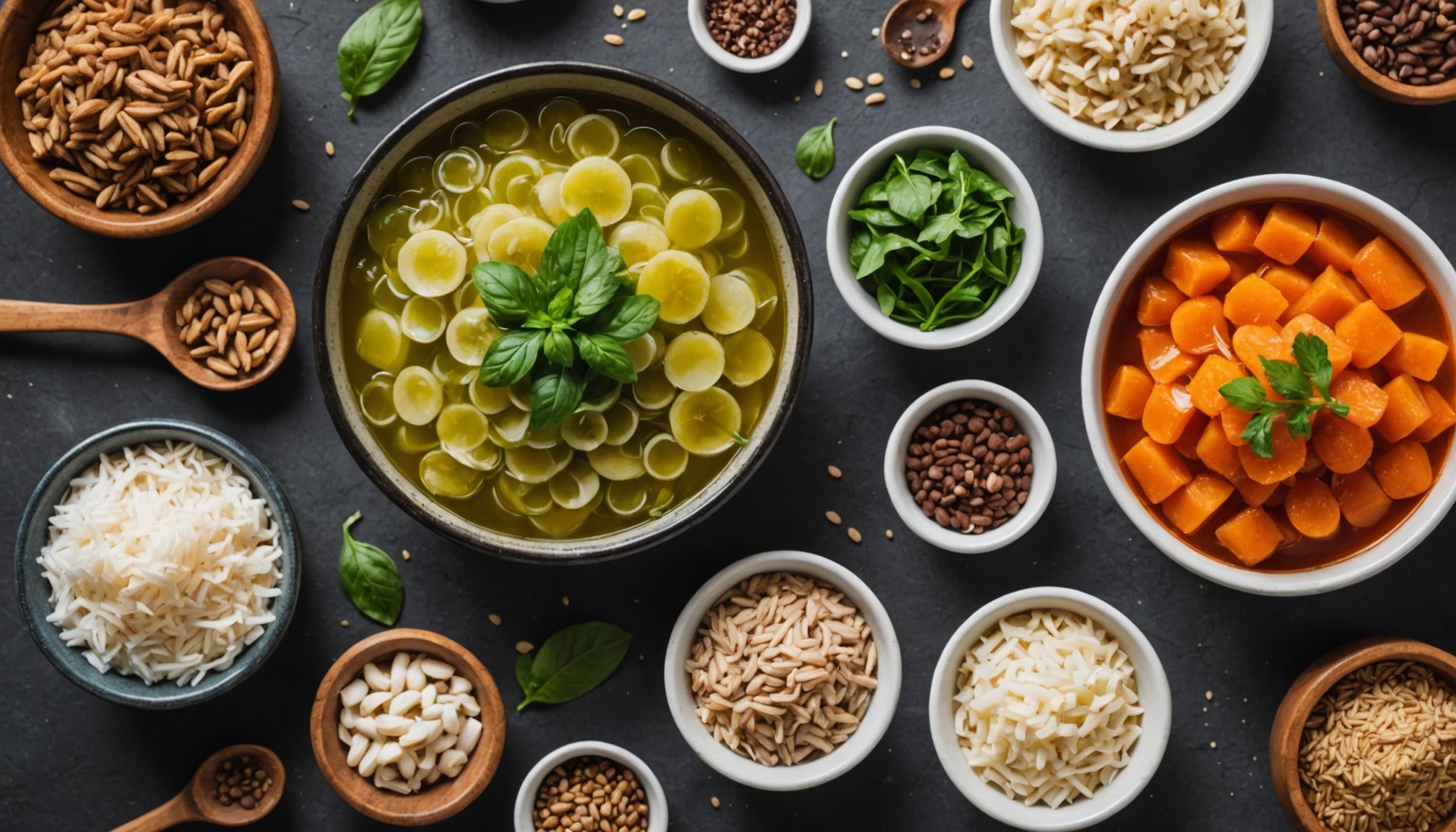Unlocking Gut Health: The Surprising Advantages of Adding Fermented Foods to Your Diet
The Power of Fermentation
Fermentation, a process that has been around for centuries, is more than just a way to preserve food; it’s a key to unlocking a healthier gut and overall well-being. Fermented foods, rich in probiotics and beneficial bacteria, are gaining recognition for their numerous health benefits. From the tangy taste of sauerkraut and kimchi to the creamy texture of yogurt and kefir, these foods are not only delicious but also packed with nutrients that can transform your digestive health.
What is Fermentation?
Fermentation is a natural process where microorganisms like bacteria and yeast break down the sugars in food, producing lactic acid and creating an environment that inhibits the growth of harmful bacteria. This process enhances the nutritional value of the food, making it easier for your body to absorb essential vitamins and minerals. For instance, fermenting grains can increase the availability of certain amino acids and B vitamins, enriching the nutritional content of the food.
Also to see : Unlocking Cardiovascular Benefits: How Intensive Interval Training Transforms Heart Health
The Gut Microbiome: A Complex Ecosystem
Your gut microbiome is a complex ecosystem composed of trillions of microorganisms that play a crucial role in your overall health. These beneficial bacteria help in digestion, support your immune system, and even influence your mental health.
How Fermented Foods Impact Your Gut Microbiome
Fermented foods introduce beneficial bacteria directly into your gut, supporting a healthy balance of microorganisms essential for efficient digestion. For example, foods like yogurt, kefir, and sauerkraut contain live cultures of bacteria such as Lactobacillus and Bifidobacteria, which are known to promote a healthy gut microbiome.
Also to read : Unlocking the Power of Cold Showers: Boost Your Circulation and Strengthen Your Immune System
Here are some key ways fermented foods benefit your gut microbiome:
- Improved Digestion: Fermented foods contain increased levels of enzymes due to the fermentation process, which aids in the breakdown of food and enhances nutrient absorption.
- Boosted Immune System: The beneficial bacteria in fermented foods help build a barrier within your GI tract, protecting your immune system from pathogens and reducing the risk of infectious diseases.
- Mental Health: The gut-brain axis is a well-documented connection between your gut and brain. Fermented foods can help produce serotonin, often referred to as the “happy hormone,” which is crucial for mental health.
Health Benefits of Fermented Foods
The health benefits of incorporating fermented foods into your diet are vast and varied.
Digestive Health
Fermented foods are a two-pronged approach to digestive health. They introduce beneficial bacteria and contain increased levels of enzymes, both of which support a healthy balance of microorganisms in your gut. This can lead to improved digestion, reduced symptoms of irritable bowel syndrome (IBS), and a lower risk of digestive disorders.
Immune System
The beneficial bacteria in fermented foods help fortify the barrier within your GI tract, protecting your immune system from pathogens. This can reduce the risk of infectious diseases like colds and flu, as well as chronic conditions such as heart disease, cancer, and diabetes.
Mental Health
The connection between your gut and brain is significant. Fermented foods can help produce serotonin, which is essential for maintaining good mental health. A healthy gut microbiome has been linked to reduced symptoms of anxiety and depression.
Cardiovascular Health
Certain types of bacteria in the gut are associated with high blood pressure, heart disease, and low levels of “good” cholesterol. Consuming fermented foods can help balance these bacteria, promoting better cardiovascular health.
Practical Tips for Incorporating Fermented Foods into Your Diet
Adding fermented foods to your diet is easier than you think. Here are some practical tips to get you started:
Eat More Fiber
Fiber is a type of complex carbohydrate that cannot be digested by your body but is fermented by your gut bacteria. Increasing your fiber intake can help support a healthy gut microbiome. Here are some of the best sources of fiber:
- Oats and other grains like quinoa
- Apples, bananas, and pears
- Berries
- Sweet potatoes and white potatoes
- Cruciferous veggies: broccoli, cauliflower, and Brussels sprouts
- Peas and lentils
- Beans: kidney beans, chickpeas, black beans
Diversify Your Diet
A healthy gut is dependent on a rich gut microbiome. Here are some tips to increase your diet diversity:
- Commit to getting one new food each week at the grocery
- Try a new recipe once a week
- Use different herbs and spices in your dishes
- Start making smoothies with different fruits, veggies, and seeds
- Branch out from the typical protein, carb, veggie plate method to dishes like stews, soups, and salads where you can pack in lots of different foods
Eat Probiotics
Here are some good sources of probiotics to include in your diet:
- Yogurt and kefir
- Cottage cheese
- Miso
- Kombucha
- Sauerkraut
- Kimchi
- Pickles
- Tempeh
Making Fermented Foods at Home
Making fermented foods at home is a simple and rewarding process. Here are a few recipes to get you started:
Spicy Fermented Bell Pepper Salsa
This salsa is a fiery and flavorful condiment bursting with probiotic potential. Here’s how to make it:
- Ingredients:
- Red bell peppers
- Jalapeños or other hot peppers
- Salt
- Optional: garlic, onions, cilantro
- Instructions:
- Chop the bell peppers and jalapeños.
- Mix with salt and any optional ingredients.
- Leave to ferment in a jar for several days.
- Enjoy as a vibrant addition to any meal.
Fermented Oranges
This is a refreshing take on citrus that also offers a potential source of probiotics for digestive health.
- Ingredients:
- Oranges
- Salt
- Instructions:
- Slice the oranges.
- Toss with salt.
- Leave to ferment in a jar for several days.
- Enjoy as a tangy and healthy snack.
Common Fermented Foods and Their Benefits
Here is a table comparing some common fermented foods and their health benefits:
| Food | Health Benefits | How to Incorporate |
|---|---|---|
| Yogurt | Supports digestive health, boosts immune system | Use as a base for smoothies, add to oatmeal or granola |
| Kefir | Rich in probiotics, supports gut health | Drink as a beverage, use in smoothies or as a substitute for milk |
| Sauerkraut | High in vitamins and minerals, supports digestive health | Add to salads, use as a topping for sandwiches or sausages |
| Kimchi | Rich in vitamins A, C, and K, supports immune system | Use as a side dish, add to soups or stews |
| Kombucha | Contains beneficial bacteria, supports gut health | Drink as a beverage, use as a base for smoothies |
| Tempeh | High in protein, supports digestive health | Use in stir-fries, salads, or as a meat substitute |
| Miso | Rich in antioxidants, supports immune system | Use in soups, sauces, or as a seasoning |
| Pickles | High in vitamins and minerals, supports digestive health | Use as a snack, add to salads or sandwiches |
| Cottage Cheese | High in protein, supports gut health | Use as a base for smoothies, add to oatmeal or granola |
| Natto | Rich in vitamin K, supports bone health | Use in stir-fries, salads, or as a side dish |
Limiting Ultraprocessed Foods
While it’s important to enjoy fermented foods, it’s equally crucial to limit your intake of ultraprocessed foods. These foods tend to be higher in added sugar and saturated fat, which can decrease the good bacteria in your gut.
Why Limit Ultraprocessed Foods?
- Negative Impact on Gut Health: Ultraprocessed foods can disrupt the balance of your gut microbiome, leading to digestive issues and other health problems.
- Higher in Added Sugar and Saturated Fat: These ingredients can lead to a range of health issues, including obesity, heart disease, and diabetes.
How to Limit Ultraprocessed Foods
- Be Mindful: Enjoy ultraprocessed foods in moderation. If you love a good Oreo, it’s okay to have one occasionally, but make sure you’re getting the nutrients your body needs at other times during the day.
- Choose Healthier Alternatives: Opt for brands that are lower in added sugar and saturated fat and have better ingredients.
The Importance of Sleep for Gut Health
Your gut health and sleep are closely linked via the gut-brain axis. Here’s why getting good sleep is crucial for your gut health:
How Sleep Affects Your Gut
- Gut Microbiome Balance: Poor sleep can disrupt the balance of your gut microbiome, leading to digestive issues and other health problems.
- Digestive Health: Good sleep helps maintain a healthy gut microbiome, which is essential for efficient digestion and overall gut health.
Tips for Better Sleep
- Focus on Getting 7-9 Hours of Sleep: Aim for a solid 7-9 hours of sleep each night to support your gut health and overall well-being.
- Create a Sleep-Conducive Environment: Ensure your bedroom is dark, quiet, and cool to promote better sleep.
Incorporating fermented foods into your diet is a simple yet powerful way to support your gut health and overall well-being. From the tangy flavors of sauerkraut and kimchi to the creamy textures of yogurt and kefir, these foods offer a wealth of health benefits that can transform your digestive health, immune system, and even your mental health.
As Dr. Bulsiewicz notes, “Your gut is like a muscle that can be trained and made stronger.” By adding fermented foods to your diet, increasing your fiber intake, diversifying your diet, and limiting ultraprocessed foods, you can take significant steps towards achieving a healthy gut microbiome. So, go ahead and give your gut the gift of fermentation – your body will thank you.











